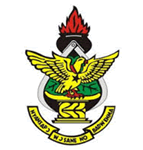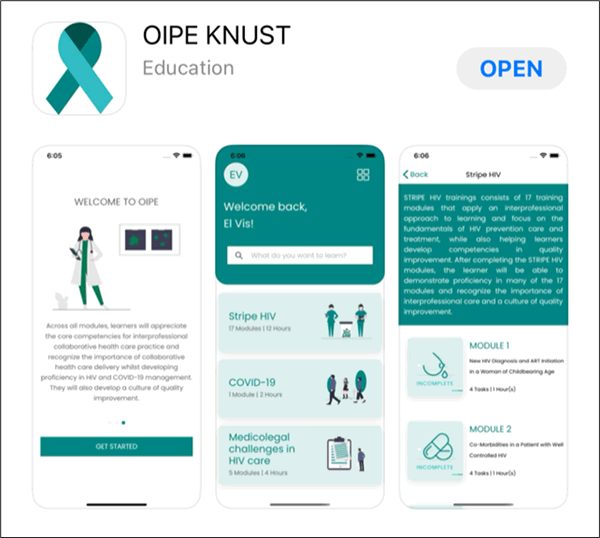 KEY PERSONNEL: Dr. Edward Dassah (Co-PD), Betty Norman (Co-PD), Veronica Dzomeku (Co-PD), Nana Adwoa Baidu (Training Coordinator, eLearning Coordinator, Finance Administrator)
KEY PERSONNEL: Dr. Edward Dassah (Co-PD), Betty Norman (Co-PD), Veronica Dzomeku (Co-PD), Nana Adwoa Baidu (Training Coordinator, eLearning Coordinator, Finance Administrator)
PROJECT TITLE: Optimizing Interprofessional Education for HIV care in Ghana (OIPE HIV Care)
PROJECT YEAR 1 RECAP: The OIPE HIV Care project sought to strengthen capacities of different categories of health professionals in Ghana to deliver the highest quality of collaborative HIV care at all levels of the health system. In all, 34 facilitators led 15 HIV workshops, providing training to 914 learners (509 pre-service, 405 post-graduate). The OIPE team also developed and delivered additional content on HIV-related medico-legal issues, trained learners remotely through a web-based e-learning platform, and rapidly implemented COVID-19 training to 254 learners via 5 virtual workshops.
The web-based and virtual workshop experience contributed to the team’s selection as an eLearning “start-up” partner at the start of the second year to innovate and sustain STRIPE HIV during COVID-19. During this period, OPIE HIV Care supported 19 facilitators to train 268 learners.
PROJECT YEAR 2 SUMMARY: The KNUST team expanded the OIPE HIV Care project to two additional collaborating institutions (see detail below) and trained learners via two-day virtual workshops. Prior to these workshops, 28 facilitators were trained to use Zoom to deliver five HIV modules, KNUST’s medico-legal challenge module, and the new STRIPE HIV teamwork and collaboration module.
To sustain learning outcomes and ultimately improve patient care, training alumni were encouraged to continue to work collaboratively and support each other. They were also given access to and encouraged to consult facilitators and experienced colleagues for continued support.
MAIN ACCOMPLISHMENTS
- As an early adopter to remote learning, OIPE HIV Care trained nearly 750 learners, making them one of the most productive STRIPE HIV projects.
- Regular bi-annual follow-up calls to previous year facilitators and learners indicate knowledge and skills acquired during training are being practiced regularly to deliver HIV patient care (see Impact Vignettes).
- The OIPE HIV Care team developed a mobile app (named OIPE KNUST) for online training. It is now available on the AppStore for iOS users and pending hosting clearance in the Google Play Store (because of the inclusion of COVID-19 content). A total of 78 students used the mobile app for online training. (Figure 1)
Figure 1. Preview of the OIPE KNUST app in the AppStore

CHALLENGES AND SOLUTIONS
Due to the urgency to pivot to eLearning in the project, training via the LMS was scaled early whilst the new AFREhealth LMS was still in the final stages of development. There were a number of issues with the LMS that came up for learners and facilitators that were managed as the process unfolded. Although this was a source of frustration, most of these issues were satisfactorily addressed.
TRAINING PARTNERS
Pre-service learners were recruited from the following universities/colleges:
- Kwame Nkrumah University of Science and Technology
- Anglican University College, Nkoranza
- Holy Family Nursing and Midwifery Training College, Berekum
PARTICIPATING CINICAL SITES
Post-graduate learners were recruited from health facilities in the Ashanti region of Ghana (Figure 2).
- St Patrick’s Hospital, Offinso (PEPFAR-supported)
- Komfo Anokye Teaching Hospital
- Kumasi South Hospital
- Manhyia Government Hospital
- KNUST Hospital
- Juaben Hospital
- Asuofua Polyclinic
Figure 2. Map of Ghana showing location of partner institutions and health facilities

IMPLEMENTATION
- # Training cohorts: 5, in addition to mobile learners
- # Facilitators Trained: 28
|
Profession |
Years of experience |
Gender |
Teaching experience |
||||
|
Medical |
6 |
0-5 years |
3 |
Male |
14 |
HIV educator |
8 |
|
Nursing/Midwifery |
9 |
6-10 years |
5 |
Female |
14 |
Non-HIV educator |
20 |
|
Pharmacy |
6 |
> 11 years |
20 |
Other |
0 |
||
|
Laboratory |
1 |
||||||
|
Other |
6 |
||||||
- # Learners trained
|
Medical |
Nursing/Midwifery |
Pharmacy |
Laboratory |
Other |
TOTAL |
|
|
Preservice |
54 |
249 |
174 |
26 |
116 |
619 |
|
Postgraduate < 12 months |
0 |
0 |
0 |
0 |
0 |
0 |
|
Postgraduate > 12 months |
15 |
75 |
11 |
11 |
17 |
129 |
|
TOTAL |
69 |
324 |
185 |
37 |
133 |
748 |
|
Gender |
|
|
Male |
352 |
|
Female |
396 |
|
TOTAL |
748 |
INNOVATING HIV TRAINING DURING COVID-19: KNUST had innovated a remote learning approach even before COVID-19 in order to expand the reach of STRIPE HIV to a greater number of trainees. As a result, they were selected during the “start up” eLearning phase of STRIPE HIV to identify best practices to sustain HIV training through online modalities. During this phase, the team identified the best practice approach of breaking up a two-day virtual workshop into four parts, where training occurs in the morning and late afternoons with breaks in the middle to avoid Zoom fatigue. This recommendation was disseminated to other STRIPE HIV partners implementing virtual workshops in the “scale up” eLearning phase of year 2.
BROADER IMPACT: Both the past and current provosts of the College of Health Sciences at KNUST have been involved in the project, and impressed by project outputs, have pursued starting IPE in the College. The current Provost constituted an IPE Committee for the College—chaired by the former Provost and comprised of STRIPE investigators and other faculty—to identify models, themes, needed skills, and modes of implementing IPE. As committee members, five OIPE facilitators are finalizing IPE modules on (1) communication in teams, (2) ethics, and (3) patient-centered care to submit to the College for consideration to be included in the College curriculum.
Furthermore, the OIPE HIV Care team has engaged the Ghana Health Service, Ghana AIDS Commission, and National AIDS/STI Control Programme to explore scaling up the training program. The Ghana Health Service has given their support for scale up and further discussions are planned.
IMPACT VIGNETTES
- STRIPE training basically was meant to bridge the gap between health care professionals in the care of HIV patients with team work in mind, that is, making sure that all the persons or the professionals who take part in the care of HIV patients will have one goal and one vision to give the best of care to their patients. So basically from our facility the training involved midwives, nurses, pharmacists and laboratory technicians and the knowledge gained has really strengthened the communication skills between these professionals in terms of team work. We try as much as possible to do our best as professionals and if there is the need to refer to the next person for continuation of care, we do. So that at the end of the day the best care will be achieved for our patients. – Midwife in-service learner, reflection provided 6 months post-training)
- STRIPE has enhanced my knowledge and the ability to monitor my patients (PLHIV) especially index client and contact tracing, requisition for viral load and monitoring to ensure the 95-95-95 targets are met. We are able to work hand in hand with EQUIP HEALTH (NGO) because STRIPE has already trained me through a refresher course. Our defaulter rate is dwindling – Physician Assistant in-service learner, reflection provided 6 months post-training
- The training has improved the working relationship between us. The breakout sessions and the interprofessional nature of the workshop made us appreciate each other better. We now appreciate the role and work of each professional. In my facility, the nurse I had the training with and I always consult on issues before implementing. I think this must be an ongoing training. – Pharmacist pre-service learner
- I will describe virtual mode of teaching as a revolution and very innovative. It allows you to join the training from any suitable location. More people can also be trained at the same time compared to in-person workshops.” – Medical Doctor/Lecturer (facilitator)







